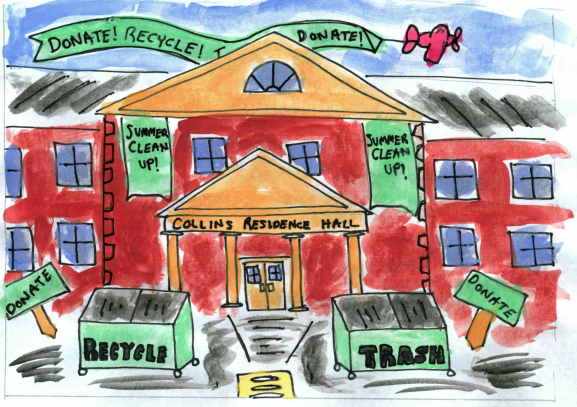As the academic year begins to wind down, a familiar frenetic buzz washes over Wake Forest’s student body.
The stresses of finals and the excitement of summer command the attention of students, so most are hellbent on rushing through the move-out process and escaping at the end of the semester.
During this frenzy, efforts to recycle dorm room supplies and books sometimes fall by the wayside.
“I’m cognizant of a lot of things, but unfortunately, waste management is not on the list,” said sophomore Kyle Ferrer. “Sadly, I’m the rule I think, not the exception.”
Each year during the move-out period, the Office of Sustainability tailors its efforts with this apathetic or hurried mentality in mind by simplifying the process as much as possible. By doing so, students can assist sustainability efforts without even realizing it.
“We work closely with Residence Life and Housing on move-out communications at the end of each school year in preparation for move-out,” said Ally Hellenga, the communication and events coordinator for the Office of Sustainability. “Residence Life and Housing collaborates with Goodwill to secure donation bins that are placed in the lobby of each residence hall.”
During the 2017 move-out period, 42,074 pounds of both recyclable and non-recyclable waste was collected from containers outside residence halls across campus, according to the Office of Sustainability.
Student awareness of which bins certain items can be placed in is essential to minimizing improper disposal.
“We know if you wait until the last second, you are just trying to shove everything in your car,” said Brian Cohen, the program coordinator for the Office of Sustainability. “It can be tough, so we try to get people to plan ahead.”
When students decide to shed themselves of old furniture and other extraneous items from their dorm rooms, myriad items are eligible for donation.
“It is our hope that sending anything to the landfill is the absolute last resort for students during move-out,” Hellenga said. “Reusable housewares, clothing, small appliances, school supplies, canned/dried food, and furniture should all be placed in blue ‘Deacs Donate’ bins.”
In recent years, sustainability efforts have become a more important focus among university administrators nationwide. According to the Association for Advancement of Sustainability in Higher Education (AASHE), more than 601 higher institutions, primarily in the United States, have become AASHE members. These institutions’ sustainability efforts are now assessed by AASHE and are given a grade based on the Sustainability Tracking, Assessment and Rating System (STARS).
These efforts have not been limited to universities, as companies within the business sector, like Walmart, have taken steps to decrease negative environmental impacts related to waste and carbon emission. These efforts are both cost-effective for businesses and helpful in decreasing the use of non-renewable resources.
One such business, Better World Books, works closely with Wake Forest to collect book donations from Wake Forest students. In 2017, Better World Books collected 2,555 pounds of books from Wake Forest for resale or donation.
“Our model has evolved over the years,” said Dustin Holland, Vice President of Global Sales and Marketing at Better World Books. “We used to have a group of college kids who would coordinate book drives at college campuses all over the country, but over the past few years, we have begun establishing strategic relationships [with administrations] on college campuses.”
When Better World Books re-sells a book donated by Wake Forest, a portion of the proceeds go to the Augustine Literacy Project, which supports literacy efforts among low-income children in Winston-Salem.
The Office of Sustainability ensures that students can seamlessly make donations to Better World Books during their move-out process.
“Most students will go to try to sell their books back, and if they will not take them back, or they offer you a price that’s not worth it, the bins are in a convenient location, and you can just drop them right there,” Cohen said.
Though guaranteeing that each student plans carefully and acts considerately when moving out at the end of the school year is unfeasible, through providing more information in advance of the move-out period and streamlining the process by which students can move out in the most environmentally-friendly way possible, the Office of Sustainability considers progress in this area to be more attainable.
“Outreach is constantly evolving. We are looking at what works and what does not work,” Cohen said. “It is simply a matter of reaching as many students as possible.”













